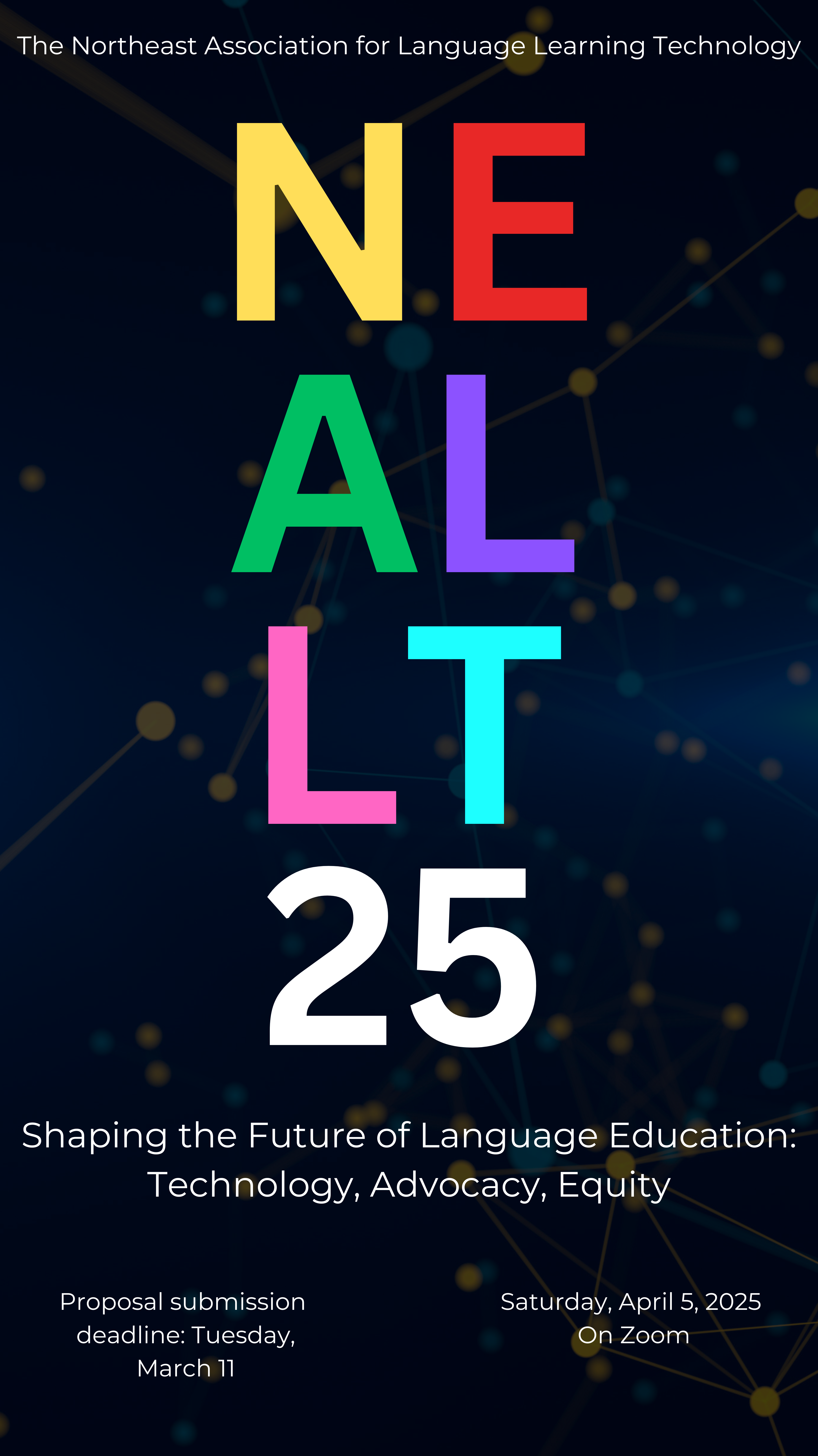NEALLT 2025
Shaping the Future of Language Education: Technology, Advocacy, Equity
Hosted virtually by The College of New Jersey
Even as advances in technology disrupt longstanding language-teaching paradigms, they also offer some of the most powerful tools for empowering student learning, advocating for language programs, and enabling learners to succeed in ways tailored to their unique needs.
Papers will explore the connections between:
• Emerging technologies and language program advocacy
• Social justice and mental health
• Individualized learning
• Future-focused curriculum development
• Equity in access to language learning resources
The conference will take place via Zoom on Saturday, April 5 from 9:15am to approximately 3:10pm.
Dr. Nicole Mills of Harvard University will deliver the keynote address.
Registration is now open. The registration fee is $35 (free for currently-enrolled graduate students). Registration entitles you to 1 year of membership in NEALLT.
Please send any questions to Christopher Kaiser (ck2831@columbia.edu) or Michael Jones (mjones1@swarthmore.edu)

| NEALLT 2025 Program | Saturday, April 5, 2025 |
| 9:15-9:30am, Eastern Standard Time |
Opening Remarks Ann Warner-Ault, The College of New Jersey, NEALLT Vice President and Conference Host |
| 9:30-10:30am |
Keynote Address
Language educators have found themselves navigating new pedagogical terrain, rethinking the role of technology, and embracing reimagination as a catalyst for transformation. This keynote explores how immersive technologies, artificial intelligence, and future-oriented curriculum design can reshape the language learning experience to be more innovative, inclusive, and impactful. Drawing inspiration from OECD future scenarios and real-world applications, the presentation showcases experimental practices that intersect virtual reality cultural immersion and AI-powered interactive experiences. These initiatives challenge the traditional boundaries of the classroom and invite us to consider alternative futures for language education—futures where students not only learn about language and culture but live it, virtually and creatively. |
| 10:30-10:45am | Break |
| 10:45-11:15am | Session 1 |
| Breakout 1 |
Once upon a Word: AI-powered Narrative-Based Language Tasks in Virtual Reality This presentation showcases a VR language learning game that uses interactive storytelling to teach English vocabulary. Built with Zoe, Eleven Labs, and ChatGPT 4.0, the game adapts to learners’ needs. Attendees will explore its design, pedagogical foundations, and potential for integrating immersive storytelling into language education through a live demo. |
| Breakout 2 |
Rejecting the Stigma: How to Think, Read, and Converse About Mental Health in the Second Language Classroom This presentation explores how Italian language courses can engage students in meaningful conversations about mental health. Grounded in content-based teaching and affect theory, it showcases pedagogical arcs using film, literature, and archives to foster empathy, vocabulary development, and cultural understanding through the lens of Italy’s mental health history. |
| Breakout 3 |
Teaching Language in the Age of AI: Practical Strategies & the Limits of Technology This presentation explores the use of AI in language instruction, highlighting practical applications, challenges and limitations. Through case studies from beginning Russian language courses, we’ll examine how ChatGPT4.0 supports students’ speaking, listening, and reading skills. We also address educators’ responsibility in assessing and correcting AI’s inaccuracies, biases, and cultural insensitivity. |
| 11:20-11:50am | Session 2 |
| Breakout 1 |
Beyond Textbooks: Teaching Spanish for Law and Justice through Multimedia Resources This presentation showcases an innovative three-course certificate program in Spanish for Law and Justice Practitioners developed collaboratively by World Languages and Criminology departments. Using film, media, and authentic materials, the curriculum builds both language proficiency and cultural competence, addressing a critical gap in preparing bilingual legal professionals to serve Spanish-speaking communities. |
| Breakout 2 |
Intersecting LGBTQI language educator identity negotiation, experience navigation, and institutional heteroprofessionalism: Case study insights This presentation describes a case-study examination of the intersection of identity, experience, and ideology from the perspective of a 26 year old bigender/pansexual ESL tertiary level educator practicing in the Turkish context for four years. Using interviews, journals, and observations, the case study reveals how institutional heteroprofessionalism shapes LGBTQI educators’ experiences and highlights the need for more inclusive, nonnormative language teaching environments. |
| Breakout 3 |
The Integration of AI-Generated Formative Feedback for Student Writing Development Since the advent of Generative AI, instructors and researchers have been trying to figure out whether and how to implement it. In this presentation I will describe the integration of MyEssayFeedback in a 4th-semester Spanish course at Cornell University to develop students’ writing and critical thinking skills through a process of inquiry and reflection. |
| 11:55am-12:25pm | Session 3 |
| Breakout 1 |
A Force for Good: Using AI to Create Open Educational Resources: A Case Study in Game-based Learning in Less Commonly Taught Languages This session will demonstrate how AI-created game-based learning resources and other non-commercial and freely accessible gaming platforms can be used to promote deeper connections with language through game-based learning. Participants will actively engage in playing a sample game with parameters that can be embedded in a variety of learning settings |
| Breakout 2 |
Building Inclusive and Engaging Learning Communities through Technology: The Case of Discord in Beginner Japanese Courses This presentation explores a three-year initiative using Discord in beginner Japanese courses to foster an inclusive learning community. By enabling real-time, student-driven interactions, Discord enhanced accessibility, sense of belonging, and student autonomy. We also examine AI ChatBot integration and discuss challenges, student feedback, and strategies for equitable language learning. |
| Breakout 3 |
Learner-Artificial Intelligence Interactions For Writing Competence Development in AI-Enabled Writing Classrooms: a Linguistic Ergonomics Investigation The increasing integration of AI-powered digital writing tools (AI-DWTs) in writing instruction calls for investigating their impact on students, teachers, and teaching pedagogies in technology-mediated language learning (TMLL) environments. This linguistic ergonomics study investigated the impact of AI-mediated writing instruction on learners’ writing competence. |
| 12:25-1:15pm | Lunch |
| 1:15-1:45pm | Session 4 |
| Breakout 1 |
The use of digital microlearning resources in Russian language teaching to reinforce student learning of grammar concepts This presentation explores how 7Taps microlearning lessons can reinforce grammar instruction in Elementary and Intermediate Russian courses. Designed for mobile use, these digital lessons align with Gen Z learning habits and aim to supplement traditional instruction with engaging, tech-based methods that enhance motivation and curriculum design. |
| Breakout 2 |
Digital Storytelling for Language Acquisition: ArcGIS Story Maps and Geography in Modern Greek This presentation explores a project from the Advanced Modern Greek courses at New York University, where students use ArcGIS Story Maps to engage with Greece’s history, culture, and geography. It will demonstrate the platform’s potential for collaborative, immersive language learning, highlighting benefits like real-world content, individualized learning, and interdisciplinary teaching approaches. |
| Breakout 3 |
Harnessing AI for Equitable and Engaging Spanish Language Learning This presentation explores how AI tools can enhance Spanish instruction through personalized learning, real-time feedback, and cultural engagement. Attendees will interact with AI-driven technologies, consider strategies for equitable integration, and reflect on ethical use. The session offers practical insights aligned with NEALLT 2025’s themes of advocacy, accessibility, and student success. |
| 1:50-2:20pm | Session 5 |
| Breakout 1 |
Empower Language Education through Digital Humanities and Technologies In this presentation, I will introduce a new approach: Digital Humanities-Augmented Technology-Enhanced Project-Based Language Learning (DATE PBLL). This model integrates CALL and DH to enrich language instruction. I will discuss theoretical foundations of this approach and use case studies to illustrate its application in language classrooms. |
| Breakout 2 | Resources for Oral and Digital Communications Sean Patrick Palmer, LaGuardia Community College This presentation highlights OERs developed to support oral and digital communication at LaGuardia Community College, including a linguistics website on spoken American English, a Speech and Poetry Database, and course materials featuring long-term assignments like podcasts. These resources foster expressive, multimodal learning and have been integrated across multiple communication courses. |
| Breakout 3 |
Harnessing AI for Future-Focused Learning: Integrating ChatGPT in Advanced Chinese Curriculum This presentation explores integrating ChatGPT into an advanced Chinese course, enhancing curriculum design and fostering independent learning. Through AI-driven projects like Community Exploration and language analysis, students refine critical thinking, cultural insights, and language skills, cultivating adaptable learners with the digital literacy to navigate an AI-integrated world. |
| 2:25-2:55pm | Session 6 |
| Breakout 1 |
Writing Instruction in the Age of AI: Navigating Opportunities, Limitations, and Ethics in Future-Focused Curriculum Design This presentation examines the dual impact of generative AI on writing instruction, highlighting both its potential limitations and benefits. It addresses ethical concerns in the evolving AI landscape, advocates for assignment design strategies that foster responsible engagement with AI tools, and underscores the need to integrate AI literacy into writing curricula. |
| Breakout 2 |
Empowering Language Educators with ChatGPT: Enhancing Lesson Planning and Material Development This session explores how ChatGPT enhances lesson planning and language material development, drawing on two years of research across multiple languages. Attendees will engage with AI-driven strategies, live demonstrations, and hands-on activities, gaining practical tools to integrate AI into language instruction while ensuring accessibility and equity in digital pedagogy. |
| Breakout 3 |
Illustrating Stories with AI: Using Leonardo AI to Enhance Narrative Writing in EFL
Leonardo AI is an advanced artificial intelligence platform designed primarily for generating high-quality images, concept art, and creative assets. It is widely used by digital artists, game developers, and designers to create detailed artwork with minimal effort. |
| 2:55-3:10pm |
Concluding Remarks Christopher Kaiser, Columbia University
|
